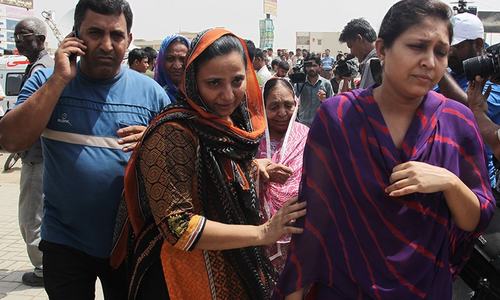KARACHI: A top counter-terrorism department official on Sunday said that unaddressed personal issues can befuddle the mind of an educated university student and make him/her easy prey for terror groups.
The Sindh police counter-terrorism department's (CTD) Deputy Inspector General (DIG) Aamir Farooqi was speaking at a seminar titled "Policing Extremism", part of a weekend-long event called "The Narrative - Karachi Calling" held at the Arts Council. The event was organised by university students from the Institute of Business Administration (IBA) Literary Society.
During the talk, Farooqi discussed the controversial case of IBA alumnus Saad Aziz, who was tried by a military court and is now on death row for his involvement in the Safoora Goth massacre and Sabeen Mehmood's murder.
The talk was also held just days after the army disclosed that it had detained Naureen, a second-year MBBS student at Liaquat University of Medical and Health Sciences (LUMHS), for her alleged links to the militant Islamic State (IS) in Syria.
Read more: Woman held after encounter in Lahore went to Syria for training
Regarding Saad Aziz, Farooqi noted that he initially grew religious due to household influences. According to the DIG, Aziz's mother had a deep interest in religious lectures and would often host them at the family residence. Aziz became more susceptible to being indoctrinated after he faced rejection in his love life, an event that Farooqi says "further cluttered his mind".
He also said that a psychoanalysis of the suspect revealed that Aziz's mental unrest developed due to his "neglected childhood", which later turned out to be a major source of his dangerous ambitions.
Aziz started educating himself with the translation of the Quran upon the insistence of some people, went for an Umrah, and then later even joined the Tableeghi Jamaat.
Explore: From IBA graduate to 'terror suspect'?
Farooqi revealed that Aziz met with Ali-ur-Rehman, an associate of Dr Israr Ahmed's 'Tanzeem-i-Islami' during an internship at a multi-national company. In 2010, Rehman introduced Aziz to a man by the name of Haris, who was linked to Al-Qaeda's Ahmed Farooq group.
Farooqi says this was the point when Aziz indulged in "terror activities" and started running Al-Qaeda's media cell. In 2011, he ventured to Afghanistan for a period of four months. Some reports claim that Aziz was in Afghanistan for militant training.
According to the DIG, Saad met with Tahir Minhas, who had already been on the police watch list and had been arrested once. Towards the end of 2014, Minhas and Aziz started to disagree with the Al-Qaeda ideology and later established contact with IS.
The DIG said that the police found ample evidence from Aziz's laptop which confirmed that he had become an active member of IS.
Talking about his criminal activities, Farooqi said that between 2014 and 2015, the suspect had been involved in targeting police officers in Karachi and Hyderabad.
Attacking law enforcement officers is part of a larger policy by such groups to destabilise state institutions, which eventually affects society as a whole, the DIG said.
At the end, Farooqi said religion does not allow anyone to take the law into their own hands "regardless of the situation".
Insecurity fosters vigilantism
Farooqi was of the view that when insecurity, discrimination, and injustice prevail, people tend to take matters into their own hands.
Referencing the Mardan university lynching, he said that trying to narrow the incident down to one reason would be futile since there is a multitude of reasons behind such an event.
He said, "Our society is riddled with intolerance, and religion is not the source. Religion does not teach us to lose our patience under any circumstance and take matters into our own hands."
Speaking about inequality and the unfair distribution of rights, Farooqi said, "Many segments in our society are deprived of basic rights. When they fail to get justice from government institutions they seek out other means."
"The problems we face in Karachi, Pakistan, and all across Muslim countries are categorised as religious extremism or terrorism in the name of religion." He added, "However, if we carefully observe the situation we come to the conclusion that these problems are actually linked to civil rights."
"Thus it is important to recognise the need to remove any misunderstandings between the fight for civil rights and religious extremism."












































